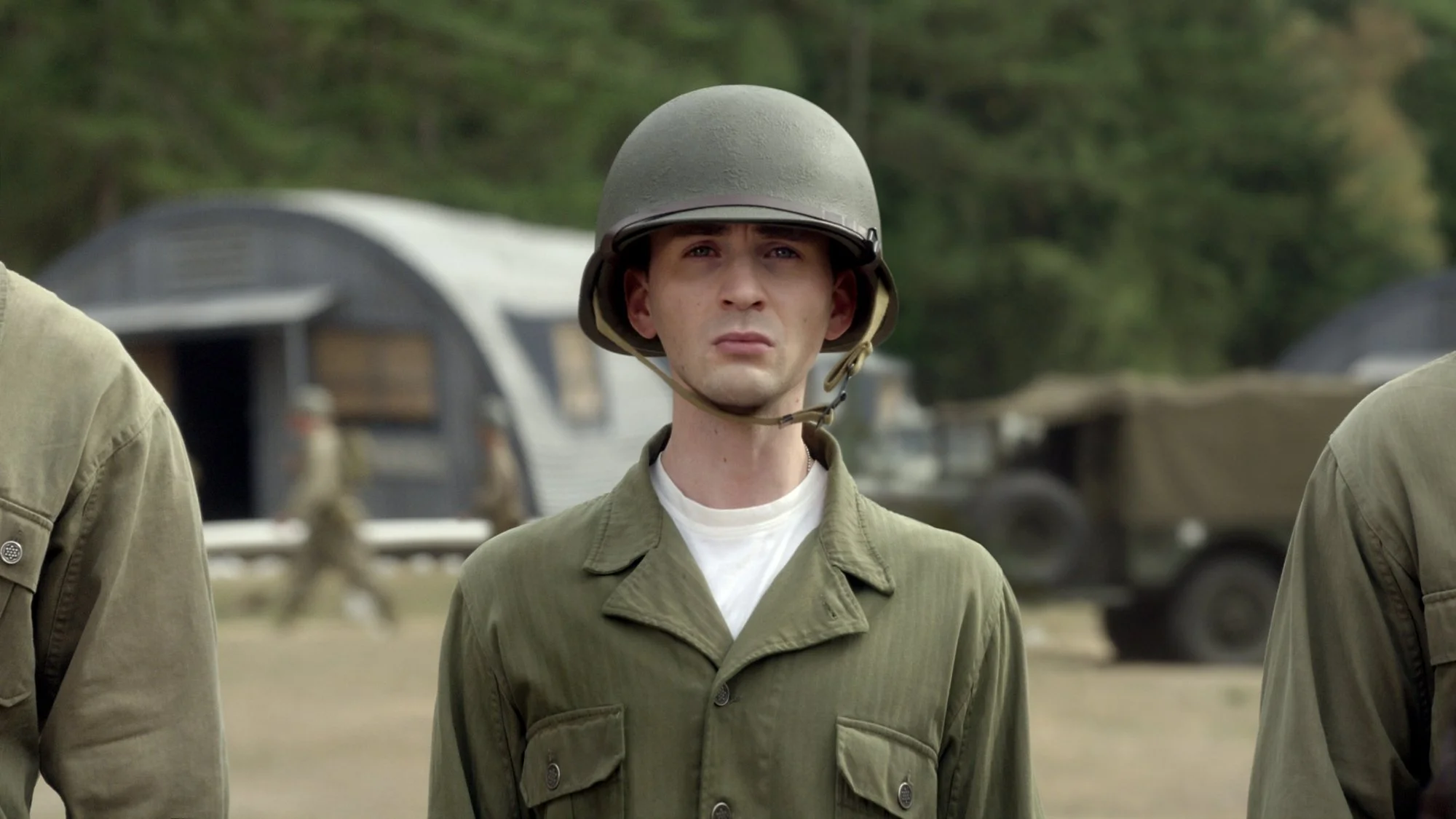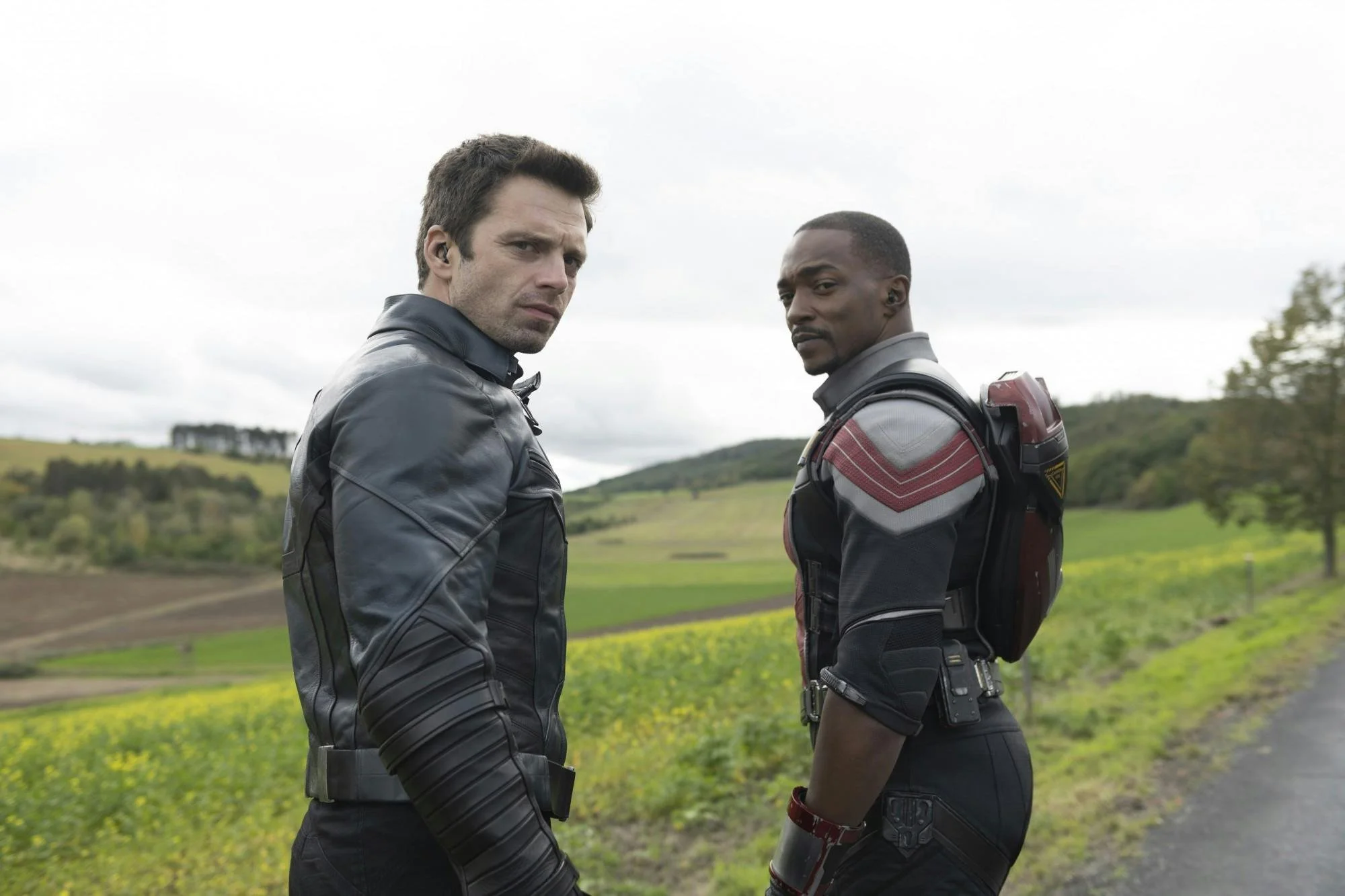Carrying the stars and stripes: A Captain America retrospective
by Darian Davis, Staff Writer
Captain America: Brave New World (dir. Julius Onah, 2025) soars across the big screen February 14th as the fourth installment of the iconic Marvel Cinematic Universe (MCU) franchise. My re-watch of the series has begun, and I’m ready to witness Sam Wilson (Anthony Mackie) embrace the star-spangled mantle in his first headlining adventure. Since Steve Rogers (Chris Evans) passed the shield to his good friend in the final minutes of Avengers: Endgame (dir. Anthony Russo, Joe Russo, 2019), I’ve been equally nervous and thrilled to watch Sam become Captain America. Will characters in the MCU accept a Black man in the stars and stripes? Moreover, will moviegoing audiences accept a Black man in the stars and stripes? The answer is complicated, but my return to the Captain America movies has made it clear to me that the decision to put Sam Wilson in the suit is sound for many reasons, not only due to literary precedent, but because of the core values of service, sacrifice, and compassion he and Steve share.
When Steve appeared to Sam on that bench in Endgame, I was already familiar with the hand-off. It happened in the comics five years before the movie, beginning with Captain America #25 (2014). I remember staring at the cover on the rack: Headshots of the Avengers circled a blank outline of the titular hero with a single question posed in block letters: “Who is the NEW Captain America?” In the issue, Steve Rogers is an old man, white-haired and wrinkled just like in the movie, though the reason for the physical change differs in the comic book, wherein Steve was drained of the super soldier serum, reducing him to the limits of his true age. In the panels, Sam reluctantly accepts the mantle, and his journey as the new Cap plays out in the pages of his very own title. I furiously collected the first few issues of Sam Wilson’s book. As a Black man and a Cap fan, I was elated to see someone who looked like me kicking ass in red, white, and blue. It swelled in me a level of patriotism I hadn’t felt in a long time, and I have returned to the issues often to feel inspired all over again. Similar to the comics, the MCU Sam Wilson is just as apprehensive. In The Falcon and the Winter Soldier he wrestles with the weight of the role not only in how it will define him as an individual, but also in how he will define it as a symbol loaded with American idealism.
The archetype of that American idealism is best displayed in Captain America: The First Avenger (dir. Joe Johnson, 2011). The fact that Marvel made a major blockbuster as a 1940’s period film is its own gutsy move, but necessary to emphasize the origin of Steve Rogers’ values. One could argue whether they’re “old-fashioned”, but it might be fairer to say that Steve’s views were more broadly held in past generations. In any event, before he becomes a muscle-bound super soldier, Steve Rogers first appears as a scrawny wisp of a man from Brooklyn who, after standing his ground in a back alley scrap, proves he has enough heart to fill the Empire State. That perseverance and valor continues as Steve makes every attempt to enlist in the war effort, not only to “fight Nazis” as Doctor Erskine (Stanley Tucci) so bluntly states, but to do his part to protect the greater good. Sam Wilson shares this same sense of duty. After serving two tours in the United States Air Force, Sam is still committed to service by counseling fellow veterans suffering from PTSD.
When Sam and Steve meet in Captain America: The Winter Soldier (dirs. Joe Russo, Anthony Russo, 2014), they bond over their shared experiences in the military and the sacrifices they endured during that time. This connection solidifies the essence of Captain America as a dutiful serviceman, while also forcing him to confront the realities of modern politics. This entry digs into the gray areas around simply complying with commands, revealing service as a double-edged sword. Steve faces a crisis of identity as a man without a mission, but Sam leans into his individual freedom now that he no longer has to take orders, especially on the days he “had a hard time finding a good reason for being out there” while serving. Sam’s doubts about the infallibility of bodies like the U.S. government or S.H.I.E.L.D. match Steve’s worldview. Can these entities protect individual liberties with transparency and accountability? Can Steve trust his country to do what’s right? The question around the “right” thing to do becomes relative, making The Winter Soldier a complex and entertaining film, and arguably one of the MCU’s best. Nick Fury (Samuel L. Jackson) subscribes to the “trust but verify” philosophy. He tells a sobering anecdote about his granddad’s love for people despite carrying a gun in his lunch bag in case of muggers. It’s then that Nick reveals the weapons-studded helicarriers built as deterrents for invasive threats, but Steve quickly condemns their existence. Steve knows a lack of trust in people breeds fear, which leads to isolation and eventually war; but believing the best in others strengthens trust, making space for reconciliation, redemption, and ultimately peace. When Cap discovers that Hydra has been pulling the strings within S.H.I.E.L.D. all along, his doubts are confirmed.
Even still, Steve’s faith in the innate good of individuals lives on in the pursuit of his friend Bucky aka the Winter Soldier (Sebastian Stan), highlighting friendship as another major theme throughout the franchise. Even though Sam has questions about whether Steve’s longtime pal is worth saving, he stands by Steve, absconding from the authorities to help prove that people are good at their core, and can be redeemed from their worst transgressions. In today’s society, you’d be hard-pressed to find anyone advising you to give a cold-stone killer a second-chance, but Steve doesn’t see it that way. He can look past the brain-washed Hydra assassin to the man who has stood by him through bullies and bad dates, and once told him he’d be with him “to the end of the line”. In Captain America: Civil War (dir. Joe Russo, Anthony Russo, 2016), Sam goes all in on that mission trusting that Bucky can be reformed. When Sam and Bucky are forced together, literal sparks fly! They don’t hate each other, but they’re not chummy either; best exemplified in the VW Beetle they pack into (and the subsequent off-camera road trip) and Bucky’s annoyed request for Sam to move up his seat, to which Sam coldly replies “no.” However, their support for Steve is enough to thaw their association, and they both can’t help but smile when their friend finally plants an affectionate kiss on Sharon Carter (Emily VanCamp).
Thankfully the mutual friends of Steve Rogers make a formidable pair as seen in The Falcon and the Winter Soldier. By this time, Steve Rogers is gone. Dead? Presumably. I have my theories, but I digress. The First Avenger has moved on from the world stage after making many personal sacrifices, returning the Infinity Stones to their rightful timelines, and finally settling for a lifetime of dances with his best girl Peggy (Hayley Atwell). This leaves Sam in an unenviable state. Instead of immediately donning the moniker, he returns the shield and its title to the U.S. Government. Captain America becomes an official position in the military and is quickly assigned to John Walker (Wyatt Russell), another blond-haired, blue-eyed “super soldier.” Ultimately, Scott’s ultra-conservative hardline views turns the stars and stripes into a hyper-violent punishing force, requiring the might of Sam, Bucky, and Joaquin Torres (Danny Ramirez) to apprehend Walker and restore honor and dignity to the shield. In the end, it’s this pursuit of Walker that helps Sam realize that who stands behind the shield matters a whole lot less than what they stand for.
In the franchise’s first entry, Doctor Erskine sets the stage for the values guiding the character. He qualifies the super soldier serum by stating that it only amplifies the nature already present in the person who takes it: “good becomes great, bad becomes worse.” Erskine also notes that “a strong man who has known power all his life may lose respect for that power, but a weak man knows the value of strength and compassion”. Sam echoes these words when speaking to U.S. senators in the finale of The Falcon and the Winter Soldier, saying they have “... as much power as an insane god” but must ask themselves how they are going to use it. Erskine asks Steve to promise that he will stay who he is: “not a perfect soldier, but a good man.” Sam’s commitment to fighting for the good of others with compassion and integrity keeps good on that promise, honoring Cap’s legacy and completing his transition.
Cap remains one of my favorite superheroes because of his aspirational values. I’m inspired to be like him, and often try to find small ways to apply the character’s defining principles like compassion, humility, service, and sacrifice every day. The big bonus is that Captain America now looks like me, reinforcing the idea that a Black man can be caring, honest, and just. I’m impressed with how Anthony Mackie has embodied Sam Wilson’s transformation. Like Christopher Reeve as Superman and Robert Downey Jr. as Iron Man, Chris Evans will forever be synonymous with Captain America in the pantheon of iconic comic book castings. And to that I say, very well! Mackie gets to play innovator by bringing his own smooth swagger and sense of humor to the role. As Sam Wilson dons his new custom vibranium suit (courtesy of Wakanda) in Brave New World, a mysterious new villain (Giancarlo Esposito) and newly-elected Thaddeus “Thunderbolt” Ross (Harrison Ford) threaten to test his mettle. No matter what, I’m looking forward to watching Sam do his best, knowing he’s up to the task. Steve knew this too. In Endgame, when Sam accepts the mantle and assures Steve he’ll do his best, Steve validates his successor by nodding to the shield and simply stating, “That’s why it’s yours.” Here’s to Captain America.
Support MovieJawn Staff
〰️
Support MovieJawn Staff 〰️
With the death of so much print media and meaningful journalism, it is important now more than ever to support the writers and outlets you love.
If you enjoyed this article, show your support by donating to our writer. All proceeds go directly to the writer. Recommended donation is $5.








